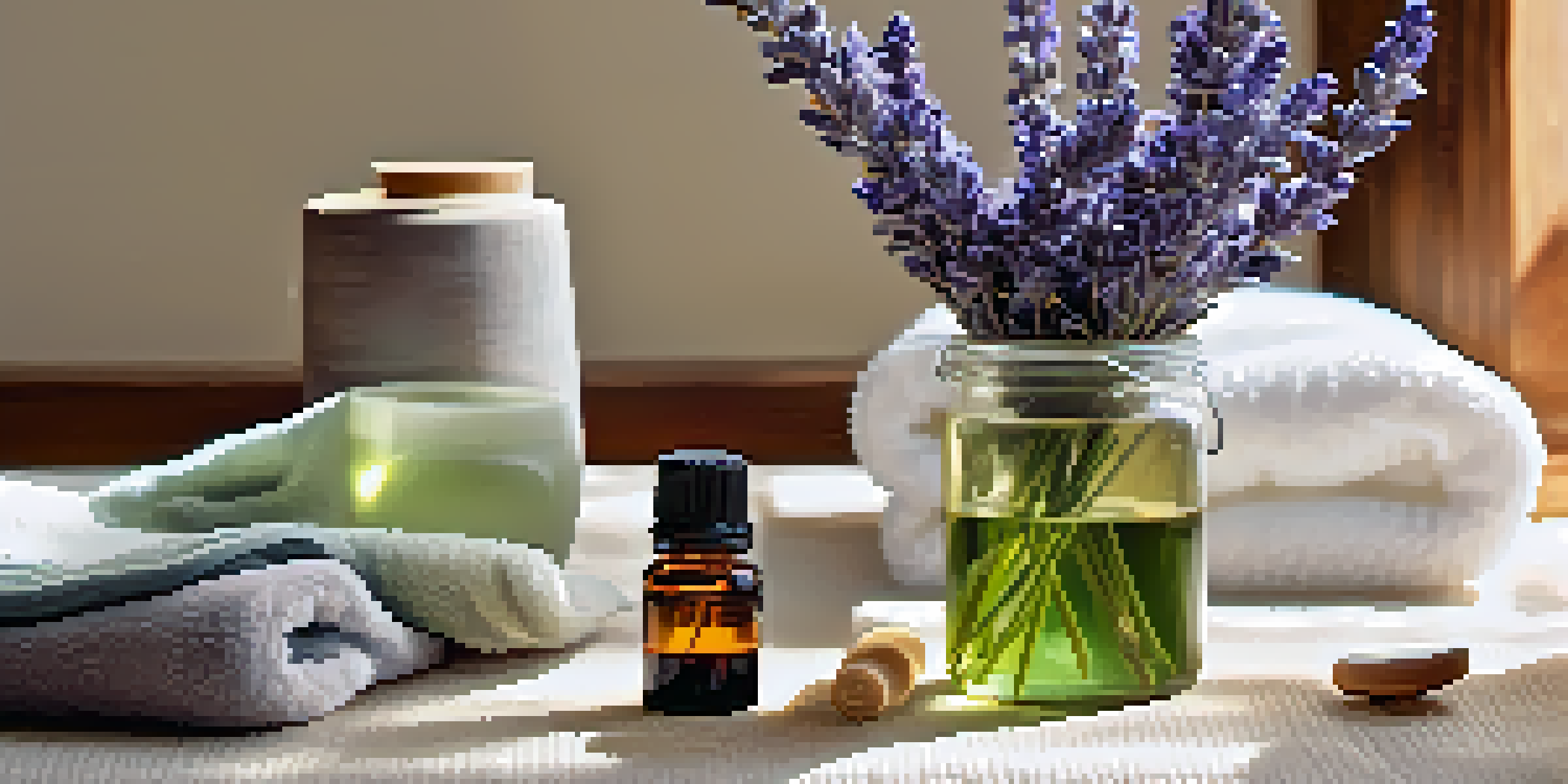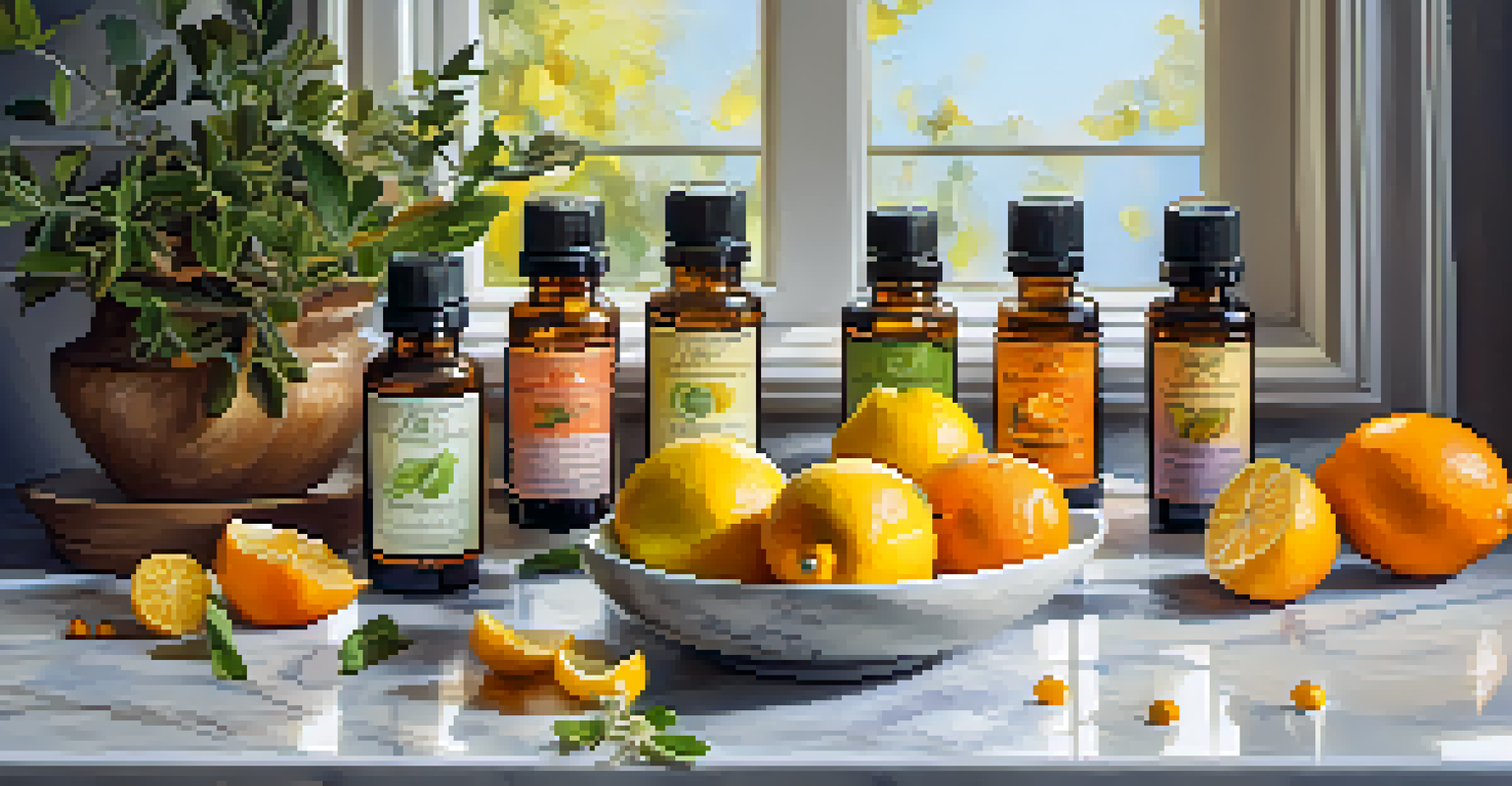Aromatherapy: The Healing Power of Plant Essential Oils

What is Aromatherapy and How Does It Work?
Aromatherapy is a holistic healing practice that uses plant-derived essential oils to promote physical and emotional well-being. These concentrated oils, extracted from flowers, leaves, and roots, are believed to harness the natural healing properties of plants. When inhaled or applied to the skin, they can stimulate the brain's olfactory system, influencing mood and health.
The sense of smell can unlock memories and emotions, and it has the power to influence our well-being.
Imagine walking through a garden filled with fragrant lavender or refreshing eucalyptus. The scents can evoke memories, alter our emotions, and even affect our physical health. This connection between smell and well-being is the foundation of aromatherapy, making it a powerful tool for relaxation and healing.
Whether it's through diffusing oils in your home or using them in a massage, aromatherapy offers a natural way to enhance your quality of life. It's not just about the pleasant smells; it's about tapping into the healing potential that nature has to offer.
The Benefits of Essential Oils in Aromatherapy
Essential oils are known for their diverse range of benefits, from reducing anxiety to alleviating pain. For example, lavender oil is often used for its calming properties, helping to ease stress and promote restful sleep. Similarly, peppermint oil can invigorate the senses and relieve headaches, making it a popular choice for a quick energy boost.

These oils work on both a physical and emotional level. When you inhale a soothing scent, your brain releases neurotransmitters that can enhance mood and promote relaxation. This dual action makes essential oils a versatile option for anyone looking to improve their overall health and well-being.
Aromatherapy Enhances Well-Being
Aromatherapy utilizes plant-derived essential oils to promote physical and emotional health through scents.
Additionally, some essential oils possess antimicrobial properties, which can aid in purifying the air and boosting immunity. Incorporating these oils into your daily routine can create a healthier environment, both physically and mentally.
How to Use Essential Oils Safely
While essential oils offer many benefits, it's crucial to use them safely. They are highly concentrated substances that can cause skin irritation or allergic reactions if applied improperly. Always dilute essential oils with a carrier oil, such as coconut or jojoba oil, before applying them to the skin.
Aromatherapy is a bridge to the healing properties of nature, a connection that nurtures our mind, body, and spirit.
It's also important to perform a patch test when trying a new oil. Simply apply a small amount to a discreet area of the skin and wait 24 hours to check for any adverse reactions. This simple step can help ensure that your aromatherapy experience is both enjoyable and safe.
Lastly, be cautious with the oils you choose, especially if you're pregnant, nursing, or have pre-existing health conditions. Consulting with a healthcare professional can provide guidance tailored to your individual needs.
Popular Essential Oils and Their Uses
There are countless essential oils available, each with its unique properties and uses. For example, tea tree oil is renowned for its antiseptic qualities and is often used in skincare to combat acne. On the other hand, chamomile oil is celebrated for its soothing effects, making it a favorite for promoting relaxation and sleep.
Other popular choices include citrus oils like lemon and orange, which can uplift your mood and energize your environment. The versatility of these oils means you can mix and match them to create personalized blends that cater to your specific needs and preferences.
Essential Oils Offer Diverse Benefits
Essential oils, like lavender and peppermint, provide various health benefits, from reducing stress to boosting immunity.
Understanding the different uses of essential oils allows you to harness their full potential. Experimenting with various combinations can lead to discovering new favorites that enhance your well-being.
Creating Your Own Aromatherapy Blends
One of the most enjoyable aspects of aromatherapy is creating your own essential oil blends. Start with a base oil and add a few drops of your favorite essential oils to discover combinations that resonate with you. For instance, mixing lavender and bergamot can create a calming blend perfect for winding down after a long day.
To create a well-balanced blend, consider the top, middle, and base notes of each oil. Top notes are typically light and uplifting, like citrus oils, while base notes provide depth, such as sandalwood. Understanding this hierarchy can help you craft harmonious blends that soothe the mind and body.
Don't be afraid to get creative! Keep track of your recipes and experiment until you find the combinations that work best for you. Making your own blends can be a rewarding experience that adds a personal touch to your aromatherapy journey.
Incorporating Aromatherapy into Your Daily Life
Incorporating aromatherapy into your daily routine can be simple and enjoyable. Start by adding a few drops of essential oil to your bath or shower to create a spa-like atmosphere at home. Alternatively, you can use a diffuser to disperse calming scents throughout your living space, promoting relaxation and clarity.
You can also take aromatherapy on the go with you. Consider using essential oil roll-ons or scented inhalers to have your favorite oils at your fingertips wherever life takes you. A quick whiff of peppermint or citrus can be just what you need to recharge during a busy day.
Safety is Key in Using Oils
To safely enjoy essential oils, it's important to dilute them and conduct patch tests to avoid adverse reactions.
By making aromatherapy a part of your everyday life, you can cultivate a sense of peace and well-being that enhances your overall quality of life. Small changes can lead to significant impacts, making it easier to manage stress and promote health.
The Future of Aromatherapy and Holistic Health
As the world continues to embrace natural healing practices, the popularity of aromatherapy is on the rise. Many people are seeking alternatives to conventional medicine, turning to holistic approaches that prioritize overall well-being. The growing body of research supporting the benefits of essential oils only strengthens this trend.
Incorporating aromatherapy into wellness programs, workplaces, and healthcare settings is becoming more common. With ongoing studies exploring the effects of essential oils on mental health, pain management, and stress reduction, the future looks promising for this ancient practice.

As we continue to learn about the healing properties of nature, aromatherapy is likely to play a significant role in promoting a balanced and healthy lifestyle for generations to come. Embracing these timeless remedies can lead to a more harmonious existence.